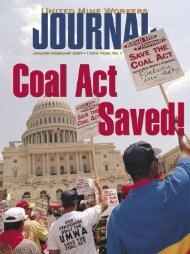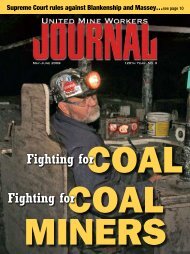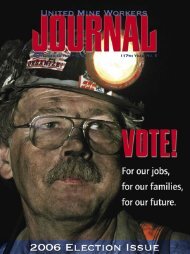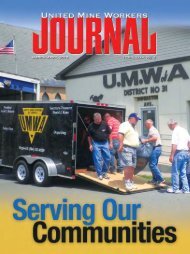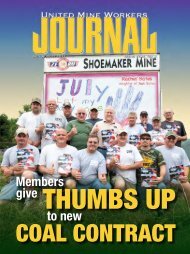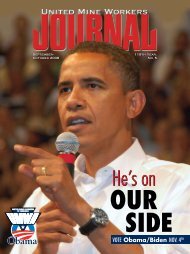March - April - United Mine Workers of America
March - April - United Mine Workers of America
March - April - United Mine Workers of America
- No tags were found...
You also want an ePaper? Increase the reach of your titles
YUMPU automatically turns print PDFs into web optimized ePapers that Google loves.
“thIs Is aelites who are funding these politiciansaren’t interested in whetherthere’s a strong middle class or not.All they care about is whether workershave any ability to challenge theelites’ control over our economy. Aslong as we’re ‘kept in our place,’they’re happy.”picking our pocketsThe UMWA represents several thousandpublic employees in states andmunicipalities all over the <strong>United</strong>States. They see the whole issue <strong>of</strong>reducing “over-generous” benefitsfor what it is: Nothing more than away for politicians to take money out<strong>of</strong> the pockets <strong>of</strong> those who serve usto pay for tax cuts that benefit thewealthiest <strong>America</strong>ns.“They say they’re trying to cutcosts,” said George Wilson, a l.U.2004 correctional <strong>of</strong>ficer at the JeffersonCountyprison inBrookville, Pa.“I used to workin another field,George Wilson,L.U. 2004DAVID KAMERASers use it as an interest-free loan.That’s where they always go whenthey want to stiff us.”According to Tax.com’s PulitzerPrize-winning analyst DavidCay Johnston, “Out <strong>of</strong> every dollarthat funds Wisconsin’s pensionand health insurance plans for stateworkers, [every cent] comes fromthe state workers. how can that be?Because the ‘contributions’ consist<strong>of</strong> money that employees chose totake as deferred wages—as pensionswhen they retire—rather than takeimmediately in cash.“It’s about bustIngunIons, perIoD.”“The same is true with thehealth care plan,” Johnston’s analysiscontinues. “Thus, state workers arenot being asked to simply ‘contributemore’ to Wisconsin’ s retirementsystem. They are being asked toaccept a cut in their salaries so thatthe state <strong>of</strong> Wisconsin can use themoney to fill the hole left by tax cutsand reduced audits <strong>of</strong> corporationsin Wisconsin.“The fact is that all <strong>of</strong> the moneygoing into these plans belongs tothe workers because it is part <strong>of</strong> thecompensation <strong>of</strong> the state workers,”he said. “The fact is that the stateworkers negotiate their total compensation,which they then divvy upbetween cash wages, paid vacations,health insurance and, yes, pensions.”and they wentafter the pensionsthere too.Employconsin,”said l.U. 6126 PresidentJoe Martinez, who represents publicworkers in las Animas County, Colo.“I think that all these states havesomehow overstepped by taking itout on their workers. These governorsand legislators aren’t giving upanything. If it’s going to be fair, makeit fair across the board.“Some unions are afraid to doanything, because they’re gettingslammed,” Martinez said. “It’s goingto be a heck <strong>of</strong> a battle for them to gettheir negotiating rights back. here athome, our contract expires at the end<strong>of</strong> the year, and who knows what’sgoing to happen then? Will they tryto take it out on us? We’ll see, butthey’ll be in for a fight if they do.”“This situation in Wisconsinsimply can’t stand as a precedent,”said Rhonda Smith, a l.U. 1995member at Southeastern IllinoisCollege in harrisburg,Ill. “I think there’s definitelya need for unions.I would hate to thinkwhat my job would belike without a union. It’sscary that someone couldYolanda Betz,come in and pull thisL.U. 1995out from under us. It’sun-<strong>America</strong>n. We could all end upcleaning floors.”“It’s about bustingunions, period,”insisted Smith’s colleague,Yolanda Betz.“They would loveto get rid <strong>of</strong> us—it’sDAVID KAMERASthey’re everywhere“My members are hoping that itdoesn’t get any worse here, thatit doesn’t go like it did in Wis-6 <strong>March</strong>/<strong>April</strong> 2011 • <strong>United</strong> <strong>Mine</strong> <strong>Workers</strong> Journal
concerteD effort by the elIte 1 percent to take us back to before the new Deal.”<strong>April</strong> Johnston,L.U. 16that simple. Iremember whatReagan did withthe air trafficcontrollers. Thatwas the beginning.I feel that’spretty muchwhat they’re tryingto do to us everywhere.“Illinois is in financial troublenow,” Betz noted. “We’re all concernedabout whether they’ll startmessing with the retirement benefits.If the states are allowed to declareA nationwide battleThe war against public employees gained publicity inWisconsin, but in no way is limited by state or region,as monitoring by the AFL-CIO indicates.• Michigan Governor Rick Snyder is pushing a new law underthe guise <strong>of</strong> fiscal responsibility that will allow him to appointemergency fiscal managers with powers so expansive theycould fire local elected <strong>of</strong>ficials, break contracts, seize and sellassets, eliminate services and even eliminate whole cities orschool districts without any public input.• In Maine, Governor Paul LePage exempted himself froma budget bill that requires teachers and other state employeesto increase their pension contributions from 7.65 percent <strong>of</strong>their salary to 9.65 percent. He then ordered the removal <strong>of</strong>a mural depicting the struggles <strong>of</strong> workers in Maine from thestate’s Department <strong>of</strong> Labor <strong>of</strong>fices.• Laws curtailing the rights and compensation <strong>of</strong> public serviceemployees or calling for privatization <strong>of</strong> public services havebeen introduced in Arizona, Florida, Idaho, Iowa, Kansas,Maine, Michigan, Minnesota, New Hampshire, New York, Ohio,Oklahoma, Tennessee, Utah and Wisconsin.DAVID KAMERASbankruptcy, we’d lose half <strong>of</strong> ourretirement. I’m very concerned that agovernor can come in and take awayour bargaining rights. I think everyunion has to stand together andmake a stand in this country.”<strong>April</strong> Johnston, a l.U. 16corrections <strong>of</strong>ficer in the ClarionCounty, Pa., prison, agrees. “Youcan’t keep taking money from themiddle class while tax cuts that aresupposed to create jobs don’t work.I think these governors do this toget more money from big businessfor the next election run, becauseCasey Mullooly,L.U. 522that’s where themoney’s goingto come from.It’s ‘I’ll scratchyour back if youscratch mine.’”“This is aconcerted effortby the elite 1 percentto take us back to before the NewDeal,” said Casey Mullooly, a l.U. 522member working at the WestmorelandCounty prison in Pennsylvania.“They’re trying to take away the right<strong>of</strong> anyone to bargain and reduce us • The Florida House passed a bill that would slash unemploymentbenefits from 26 weeks to a sliding scale <strong>of</strong> 12 to 20 weeks,and force unemployed workers to accept a minimum wage jobafter receiving 19 weeks <strong>of</strong> benefits.• In Pennsylvania, Governor Tom Corbett’s budget would cut over1,500 state jobs and slash funding for public universities in half.• Public school teachers and employees face assaults in theform <strong>of</strong> thinly veiled attacks on public schools and teachers inAlabama, Florida, Minnesota, New Hampshire and Pennsylvania,among others.• So-called right-to-work bills have been introduced in over adozen states, including Maine, Missouri, Michigan, Pennsylvania,Alaska, Tennessee and Indiana.• Paycheck deception bills, which would silence workers’ voicesin the political process, have been or soon will be introduced innearly two dozen states.• Prevailing wage laws that protect workers and communitiesfrom unscrupulous contractors who lowball bids on taxpayerfundedconstruction projects have been targeted for repeal byRepublican governors and legislatures in 19 states.DAVID KAMERAS<strong>Workers</strong> rally at the Indiana capitol againstattacks on their rights by Gov. MitchDaniels (R) and the Republican majority inthe state legislature.<strong>United</strong> <strong>Mine</strong> <strong>Workers</strong> Journal • <strong>March</strong>/<strong>April</strong> 2011 7
to slave wages. In Pennsylvania, there’sright-to-work legislation being debated.The governor has slashed publiceducation and higher education,all the things that keep the middleclass alive, while giving tax cuts tobig business.“This won’t end with the publicsector; it will move to the privatesector,” Mullooly warned. “Thanks tothe Citizens <strong>United</strong> case, unlimitedfunds are now going into elections.They know we can’t match themdollar for dollar; all we can do is putmore boots on the ground.“In this fight, the union has tobe the head <strong>of</strong> the spear,” Mulloolysaid. “We have to fight for what othersfought and died for, and last one daylonger than they do. And not just forus. If we don’t stand up for the teachers,who’s going to stand up for us?”a danger facing all <strong>of</strong> usA recent New York Times-CBS pollshows that <strong>America</strong>ns oppose effortsto weaken the collective bargainingrights <strong>of</strong> public employee unions bya nearly 2–1 margin. And more andmore, they are willing to stand upand say so.“People are looking at what’s goingon and saying, ‘This is a struggleI want to be a part <strong>of</strong>,’”said PresidentRoberts. “Every week, thousandsmore are on the march, fighting topreserve their rights.”With this kind <strong>of</strong> public support,it’s easy to see how the labor movementhas been newly energized totake back our country.“Budget deficits are just anexcuse,” said Craig Thompson, a l.U.8923 member who works in the ElkCounty, Pa., prison. “They really wantto get rid <strong>of</strong> the unions. We shoulddo as much as we can to support theunions in all these states, because if itworks there, it will help all <strong>of</strong> us.”For coalminers, the attackon publicworkers hasimmediate implications.Withthe NationalBituminousCoal WageCraig Thompson,L.U. 8923Agreement due to expire at the end<strong>of</strong> this year, we can be sure that coalemployers are looking closely atthe national debate over pensions,and may shape their bargainingstance accordingly.“these busInessesDon’t want usweakeneD—theywant us elImInateD.”“I’m going to do all I can toreach a fair agreement with the companies,”President Roberts said. “Butwe may not be able to get that donebefore the contract expires. And thenwhat? If anyone thinks that the argumentsand tactics that are being usedagainst the public employees won’tbe used against us in some form,they need to think again. Count onit: We’re next.“This ‘balancing the budget’argument is bogus,” Roberts said.“The politicians who are screamingfor spending cuts are the same guyswho give their wealthy donors everytax cut they can find.“You know, if the rich paid taxesat the same rate as they did duringthe Eisenhower administration,our national debt would be gone,”Roberts said. “And that was the time<strong>of</strong> the greatest long-term period <strong>of</strong>economic prosperity in <strong>United</strong> Stateshistory. And there were still plenty<strong>of</strong> millionaires and billionaires then,DAVID KAMERASthey were just more willing to paytheir fair share to help their countrythan they are now.”this is everyone’s fightSo what should union members do?“All public employees, and all privateemployees, are going to be affectedwithout the intervention <strong>of</strong> unions,”said Alan Bertram, a l.U. 616 corrections<strong>of</strong>ficer in Cambria County, Pa.“Over the years, union rights havecontinued to dwindle in this country.If Wisconsin sets a precedent, theattacks are going to travel all overthe country, and I don’t thinkthat’s good forworking people.”“Workingpeople have tostick together,”added Secretary-Treasurer Kane. “Itis my firm opinionthat we have to goAlan Bertram,L.U. 616back on the attack. We belong tothe most militant labor organizationin the world, and I am determinedthat we’re going to stay that way.In solidarity with our fellowunionists, we are one, and weare everywhere.”“At lattimer, ludlow, Matewan,Blair Mountain and elsewhere,members <strong>of</strong> the UMWA and ourfamilies have been the victims <strong>of</strong> theexcesses <strong>of</strong> powerful elitists like theKoch brothers and their politicalallies,” said President Roberts.“We fought back, we perseveredand we won.“Today, we stand ready to assistour brothers and sisters in sin, Indiana, Ohio and anywhereWisconelsein our country in any way wecan as they embark on their ownfight to win back their rightsas <strong>America</strong>ns,” Roberts said.“Their fight is our fight.” DAVID KAMERAS8 <strong>March</strong>/<strong>April</strong> 2011 • <strong>United</strong> <strong>Mine</strong> <strong>Workers</strong> Journal
“we are one, anD we are everywhere.”thousands march and rally forcollective bargaining rightsEMIlY SMIThBraving snow, wind, rain and cold, more than 5,000UMWA members, families, fellow unionists and othersupporters from surrounding states marched 1.5 milesthrough the streets <strong>of</strong> Waynesburg, Pa., on Apr. 1 in adefiant show <strong>of</strong> solidarity with public employees and otherworkers battling the latest wave <strong>of</strong> union-busting attacks.“If you think the attempts to cut pay and benefits forpublic employees don’t matter to you, I’ve got news foryou,” President Roberts told the marchers. “Today, it’sthe public employees. Tomorrow it’s the Steelworkers.Tomorrow it’s the Auto <strong>Workers</strong>. Tomorrow it’s the coalminers. Now is the time to stand up, fightback, turn these people around.”The march’s destination was theGreene County Fairgrounds, wherea succession <strong>of</strong> dynamic speakerswarmed up the overflow crowd withcalls to fight back against effortsin dozens <strong>of</strong> states to strip publicsector workers <strong>of</strong> their collectivebargaining rights and to furtherweaken those in the private sector.Among the guests wereSteelworkers President LeoGerard, PennsylvaniaAFL-CIOPresident RickBloomingdale,Ohio AFL-CIO President Tim Burga, Wisconsin AFL-CIOSecretary-Treasurer Stephanie Bloomingdale, MetropolitanWashington DC AFL-CIO President Joslyn Williams andformer AFSCME Secretary-Treasurer Bill Lucy.“We are at a defining momentin our history,” said Secretary-Treasurer Kane. “Giving morepower to these right-wing,job-killing, scabbing SOBsis a mistake <strong>of</strong> monumentalproportions. We’re not going to“stanD up, fIghtback, turn thesepeople arounD.”do it. We’re going to take our country back, we’re goingto kick them out <strong>of</strong> <strong>of</strong>fice and we’re going to bring ourcountry back to the people.”Another focus <strong>of</strong> the rally was the continuing campaign toconvince Alpha Natural Resources to open two new minesin southwestern Pennsylvania under a UMWA agreement.L.U. 2258 President Anthony Swetz and L.U. 2300 PresidentTony Brnusak joined others in driving that point home,pointing out that the company has made billions from thesweat and blood <strong>of</strong> generations <strong>of</strong> UMWA members.DAVID KAMERASDAVID KAMERAS<strong>United</strong> <strong>Mine</strong> <strong>Workers</strong> Journal • <strong>March</strong>/<strong>April</strong> 2011 9
Are miners sAfer?WhenPresidentBarackObama appointedHilda Solis to be theSecretary <strong>of</strong> Laborin the weeks after hisinauguration, <strong>America</strong>nworkers could have confidencethat for the first time in eight years,they had someone in the lead atthe Labor Department who was ontheir side. She grew up in a unionhousehold with both <strong>of</strong> her parentspaying union dues.A look at thestate <strong>of</strong>mine safetyand healthin 2011PhIl SMIThThen came the nomination inJuly 2009 <strong>of</strong> Joe Main to be AssistantSecretary <strong>of</strong> labor for <strong>Mine</strong> Safetyand health. A long-time UMWAhealth and safety leader who headedthe union’s Department <strong>of</strong> Occupationalhealth and Safety for over threedecades, Main brought unprecedentedknowledge <strong>of</strong> mining health and safetyissues from a miners’ perspective.“Joe is perhaps the most knowledgeableperson about mine safetyand health in the nation,” PresidentRoberts said at the time <strong>of</strong> Main’snomination. “his experience wasgained where it counts the most—fighting every day for over 30years on behalf <strong>of</strong> miners’ healthand safety.”It’s been just over two years sinceSolis took <strong>of</strong>fice and 17 months sinceMain was confirmed in his position inOctober 2009. It’s an appropriate timeto ask: Are miners safer than theywere on Jan. 19, 2009, the day beforethe Obama administration began?2010 A deAdly yeArOne measure <strong>of</strong> the effectiveness <strong>of</strong>the enforcement <strong>of</strong> mine safety andhealth laws by the <strong>Mine</strong> Safety andhealth Administration (MShA) isthe fatality statistics. “These are theone set <strong>of</strong> numbers the coal operatorscan’t hide,” President Roberts said.“They can’t figure out ways to getaround these numbers like they try todo with lost-time injury statistics.”In 2009, 18 people were killed atU.S. mines. It was the lowest number<strong>of</strong> annual fatalities on record. One <strong>of</strong>those was a UMWA member workingat the Jim Walters #7 mine in Alabama.2010, however, was a completelydifferent story. There were 48 fatalitieslast year, the most in any year since1992. One <strong>of</strong> those miners was aUMWA member working at theloveridge mine in West Virginia. 2010also saw the worst mining disaster in40 years when 29 miners were killedat the Upper Big Branch mine inMontcoal, W.Va.“Any time miners are dying,something is wrong,” Roberts said. “AtUpper Big Branch, it’s very clear thatthe operator wasn’t doing its job tokeep miners safe on many differentlevels. What’s not so clear yet is howthis mine got to the point where adisaster <strong>of</strong> this magnitude could occur.”Along with MShA and the state<strong>of</strong> West Virginia, the UMWA isparticipating in the investigation atUpper Big Branch and will be writingits own, independent report about thedisaster. “We will take a hard look atwho was responsible for what at thatmine and let the chips fall where theymay,” Secretary-Treasurer Kane said.Despite calls from the UMWA andthe media to open up the process anddo a public investigation <strong>of</strong> the UpperBig Branch tragedy, the agency has keptit closed, citing a criminal investigationthat is being conducted by the JusticeDepartment into the disaster.It’s worth noting that thegovernment’s investigation into the10 <strong>March</strong>/<strong>April</strong> 2011 • <strong>United</strong> <strong>Mine</strong> <strong>Workers</strong> Journal
PhIl SMIThwhose history <strong>of</strong> underground conditionsindicated a significant number<strong>of</strong> violations and/or bad conditions,such as problems relating to methaneaccumulations, ventilation practices,rock dust applications and inadequatemine examinations. As many as 10inspectors were sent to the minesidentified for enhanced inspections.The company most affected byMShA’s more aggressive enforcementactions was Massey Energy, whichhad seven mines targeted in the initialinspection blitz. Indeed, Massey led allU.S. coal companies in fines assessedin 2010 with $17.4 million. ConsolEnergy was second at just over $8million. Massey also had the highestnumber <strong>of</strong> significant and substantialSection 104 citations, with 4,199.The labor Department in 2009withdrew the Bush administration’sproposed rule governing the department’sassessments <strong>of</strong> occupationalhealth risks. The Bush rule wouldhave required DOl agencies to issuean advance notice <strong>of</strong> proposed rulemakingas a first step in developinghealth standards regulating workplaceexposure to toxic substancesor hazardous chemicals. This wouldhave crippled the rulemaking processfor OShA and MShA by slowingthe process down and would haverequired objective criteria not relatedto health and safety concerns.MShA has also taken steps to ad-dress the enormous backlog <strong>of</strong> chal-lenges to citations and penalties thatare effectively making enforcement allbut impossible. Operators frequentlyfile challenges in order to delay oravoid a final order that could show a“pattern <strong>of</strong> violations,” thus deferringor avoiding higher penalties.forWArd progress“MShA has taken several stepsforward but there is still much todo,” said President Roberts. “For somany years, the policies and staffing<strong>of</strong> the agency were dominated bythe mine operators and their friendsin high <strong>of</strong>fice, leading to thecreation <strong>of</strong> a culture <strong>of</strong> sympathyfor the operators that becamethoroughly entrenched.“To his credit, Assistant SecretaryMain is fighting hard to changethat culture,” Roberts said. “Weare beginning to see some positiveresults—more frequent inspections,more consistent application <strong>of</strong> thelaws and regulations, tougher penaltiesbeing assessed. That’s progress.”Roberts also noted that a significantproblem remains with themine safety and health legal process,where thousands <strong>of</strong> citation appealsfiled by operators are cloggingthe system at the <strong>Mine</strong> Safety andhealth Review Commission.“Steps were taken by the lastCongress to address this issue byadding funding so the commissioncan hire more staff to handle the ex-tra caseload,” Roberts said. “We canonly hope that the new Congresswill continue that funding, becausethere is a direct link betweenapplying the penalties operatorsdeserve for violations and miners’health and safety. When there is nodeterrence, there is no incentive forirresponsible operators to clean uptheir act.“I firmly believe the same thingsthat I believed two years ago—that Secretary Solis and AssistantSecretary Main have the best interests<strong>of</strong> miners at heart,” Roberts said. “Ibelieve that they are doing what theycan to lead both the Department<strong>of</strong> labor and the <strong>Mine</strong> Safety andhealth Administration to be betterwatchdogs on behalf <strong>of</strong> workers.“MSHA is not where we thinkit needs to be, but the signs <strong>of</strong>improvement are there.”“But change comes slowly tobureaucracies, especially those likeMShA where management has hadsuch a large influence for so long,”Roberts said. “MShA is not where wethink it needs to be, but the signs <strong>of</strong>improvement are there. Given time,the right tools and support fromboth the administration and theCongress, I know Joe Main will makethat agency the kind <strong>of</strong> watchdogthat miners need it to be.” 12 <strong>March</strong>/<strong>April</strong> 2011 • <strong>United</strong> <strong>Mine</strong> <strong>Workers</strong> Journal
activelyretiredFrank ReidelbachU. 1368 Recording SecretaryL. Frank Reidelbach certainlyputs the “active” in actively retired.Besides his elective <strong>of</strong>fice, the 33-yearmember represents the UMWA onthe Pennsylvania Coal <strong>Mine</strong> SafetyBoard, the Central Pennsylvania Arealabor Federation and is Vice Presidentand delegate to the Johnstown-Somerset Central labor Council.Reidelbach also serves on his local’sCOMPAC Committee and theUMWA Pensioner leadership Committee,is a member <strong>of</strong> the CambriaCounty health and Welfare Council,where human services agencies meetonce a month to share ideas, andis Democratic Party Chairman forEbensburg, Pa.“Frank is one <strong>of</strong> the mosttalented retirees I have ever encounteredduring my tenure in <strong>of</strong>fice,”said International District 2 VicePresident Ed Yankovich. “Not onlyis he very articulate, knowledgeableand dedicated to the mission <strong>of</strong> theUMWA and its members, he alsoalways stands ready to help out whenour union calls on him.”For Reidelbach, this is paybackfor all the ways he and his family havebenefitted from UMWA membership.“I could retire with dignity because<strong>of</strong> the union,” he said. “We made suchnice money in the mines that I wasable to invest some <strong>of</strong> it, just by beinga member <strong>of</strong> the UMWA.”A member since 1978, theformer ro<strong>of</strong> bolter retired in June2007, after serving on his local’sElection and Organizing committees.he remains very active politically,and has worked with his union onhouse-calling during several elections.“Frank’s always been there forus, especially with respect to COM-PAC,” noted At-large InternationalVice President and Region 1 DirectorDonnie Samms. “he goes beyond thecall <strong>of</strong> duty.”“I could retire with dignity because <strong>of</strong> the union.”Actively Retired is a regular feature highlighting UMWA retirees still workingon behalf <strong>of</strong> the union. If you’d like to recommend a retiree to appear in ActivelyRetired, write to the UMW Journal, UMWA, 18354 Quantico Gateway Drive,Suite 200, Triangle, VA 22172, Attn: Actively Retired. Please include yourname, local union, a telephone number and a brief explanation <strong>of</strong> why you’renominating the individual.As for his current <strong>of</strong>fice,Reidelbach’s destiny was clear. “Wehad a long-standing president in mylocal union, and when Danny Kanetook the presidency there, he askedme to run for his old job as recordingsecretary. I felt ready. I hadbeen a schoolteacher, and I wastaking industrial relations classesat St. Francis University.”“Frank’s leadership qualitieswere obvious from the very beginning,”said Secretary-Treasurer Kane.“And his commitment to our membersis without parallel. I’ve knownFrank as a leader, a strong unionbrother and a very good friend.Frank represents the best <strong>of</strong> who weare as UWMA members—he’s notafraid to stand up and take actionto defend working families and thegains we’ve made over the years. Andhe does it time and time again.”In the seemingly rare momentswhen he’s not involved in unionbusiness, Reidelbach likes to restoreantique cars. he also bought hisfamily’s old homestead and devotesmuch energy toward fixing it up, andrecently put a coal-fired boiler in it.But his thoughts seldom strayfar from the union and the challengesit faces, especially withregard to bringing in new members.“Organizing is paramount, but atthe moment it’s very difficult,” hesaid. “The operators are so intenton keeping the union out. Nonunionminers sometimes have largerpaychecks, but that’s not looking atthe whole package, including healthcare and retirement. If the UMWAwere to go away, a lot <strong>of</strong> these nonunionminers don’t realize they willbe taken down too.” <strong>United</strong> <strong>Mine</strong> <strong>Workers</strong> Journal • <strong>March</strong>/<strong>April</strong> 2011 13
Governmentin actionIndiana congressman blames minersfor getting black lungWhen labor Secretary hildaSolis testified before the houseEducation and Workforce Committeein February, she likely expectedsome tough questions from the newRepublican majority on the panel.But she probably did not expect tohear a freshman member <strong>of</strong>Congress blame coal miners forblack lung.Yet that’s just what Rep. larryD. Buchson (R) <strong>of</strong> Evansville, Ind.,did. A surgeon, Buchson is the son<strong>of</strong> a 37-year member <strong>of</strong> the UWMAand the grandson <strong>of</strong> two coal miners.“ The most effectiveway to prevent blacklung is to reduceminers’ exposureto respirable dustin coal mines.”Despite that background, he said, “Isee a lot <strong>of</strong> patients with workplacerelatedrespiratory problems, some<strong>of</strong> which, to put it bluntly, are theirown issue because they refuse towear safety equipment regardless<strong>of</strong> whether there are regulations inplace to do so or not.”“Rep. Buchson’s commentreflects a serious lack <strong>of</strong> understandingabout the causes <strong>of</strong> black lungand how to prevent it,” PresidentRoberts said. “The most effective wayto prevent black lung is to reduceminers’ exposure to respirable dustin coal mines.“Wearing masks or respiratorscan help,” Roberts said. “But they arenot the cure-all Rep. Buchson seemsto think they are. Respirators shouldbe the ‘last line <strong>of</strong> defense’ againstrespirable coal dust, because if theyare the first line <strong>of</strong> defense, it cangive irresponsible operators a reasonto let dust get out <strong>of</strong> control in themine atmosphere. And that cancreate even more problems.” new push to kill campaignfinance regulationsIn the wake <strong>of</strong> last year’s decision by the Supreme Court to allow unlimitedand anonymous spending by corporations in federal campaigns, severalright-wing groups are working to undo even more prohibitions on the sources <strong>of</strong>campaign funds.A report in The Politico, a political daily online magazine, said thatopponents <strong>of</strong> campaign finance regulations have targeted “almost every type<strong>of</strong> regulation on the books: disclosure requirements, bans on foreign andcorporate contributions and—in a pair <strong>of</strong> cases the Supreme Court will considerthis month—party spending limits and public financing <strong>of</strong> campaigns.”Their goal is to allow untold billions <strong>of</strong> dollars from multinationalcorporations to be used in the campaigns <strong>of</strong> those who will do the bidding <strong>of</strong>those corporations.“There is no question that the 2010 ruling by the Supreme Court was a bigpart <strong>of</strong> the right-wing victory in the 2010 election,” President Roberts said. “Itmeant that corporations could contribute millions <strong>of</strong> dollars to shadowy groupswhich then ran ads opposing the friends <strong>of</strong> working families. And they could doit without anyone knowing about it.“The defeat <strong>of</strong> Rick Boucher in Virginia is a perfect example,” Roberts said.“Boucher had more money in his campaign warchest than his opponent, butthat really didn’t matter. The political PACs funded by anonymous donationsfrom corporations and the very wealthy outspent Boucher’s supporters by tento-one.“This is how the people in Wisconsin ended up with an anti-working familygovernor like Scott Walker,” Roberts said. “It’s how people in Ohio ended upwith John Kasich, another governor who has working people and unions in hiscrosshairs. The list goes on and on.“And it’s not going to get any better if these new attempts to open thefloodgates to corporate cash are successful,” Roberts said.14 <strong>March</strong>/<strong>April</strong> 2011 • <strong>United</strong> <strong>Mine</strong> <strong>Workers</strong> Journal
Governmentin actionJapanese earthquake and tsunami raisequestions about safety <strong>of</strong> nuclear powerThe incredibly powerful earthquakeand resulting tsunamithat devastated northeastern Japanin early <strong>March</strong> left thousands deadand hundreds <strong>of</strong> thousands homeless.It also caused what is still unfoldingas the worst nuclear powerdisaster in history.With several reactors releasinglarge amounts <strong>of</strong> radiation, Japanese<strong>of</strong>ficials ordered a complete evacuation<strong>of</strong> an area 19 miles outside theFukushima power plant. <strong>America</strong>ndiplomats advised <strong>America</strong>n citizensto move at least 50 miles away fromthe crippled plant.“ The spent fuelfrom a nuclear plantis still deadly forthousands <strong>of</strong> years.”Reports <strong>of</strong> contaminated food,water and milk are growing in Japan.Although it is highly unlikely thatany significant amount <strong>of</strong> radioactivecontamination will reach the <strong>United</strong>States, there is significant radiationbeing detected <strong>of</strong>f Japan’s coast, raisingquestions about the impact onsea life.Within days <strong>of</strong> the disaster,governments around the world beganstepping back from supporting newdevelopment <strong>of</strong> nuclear power in theircountries. Germany said it would shutdown older reactors. Slowdowns inlicensing procedures and enhancedsafety inspections were immediatelyput in place in France, Switzerland,Thailand, India and China.In the <strong>United</strong> States, where severalnuclear reactors sit on top <strong>of</strong> orwithin 50 miles <strong>of</strong> major fault lines,questions are being raised about thesafety <strong>of</strong> the reactors currently inuse as well as about how new plantscould be built that would be safe.Government regulators and thecompanies operating the U.S. nuclearplants have repeatedly said the plantsare safe. But concerns linger.“let’s face it, nuclear energy hassome pretty significant downsidesto it,” Secretary-Treasurer Kane said.“And it’s not just in those times whenthings go wrong.“The spent fuel from a nuclearplant is still deadly for thousands <strong>of</strong>years,” Kane said. “That means thatlong after all the coal is gone, longafter all the oil and natural gas aregone, people are still going to haveto contend with preventing deadlynuclear waste from contaminatingour environment and threateningpeople and wildlife.“That needs to be part <strong>of</strong> theequation as our nation looks to builda long-term, viable and realistic energypolicy that will serve us into thefuture,” Kane said. “Nobody’s reallybeen talking about that up to now.But it’s time we started.”You can help theJapanese disastervictimsThe <strong>America</strong>n Red Cross is acceptingdonations that will go directly to Japaneserelief efforts. Contact your local Red Crossor go to www.redcross.org and click on“How to Help.” Save the Children, whichis the world’s largest independentchildren’s assistance organization,has sent a team to Japan to help withrelief efforts. You can contact themby calling 1-800-728-3843, or go towww.savethechildren.org. <strong>United</strong> <strong>Mine</strong> <strong>Workers</strong> Journal • <strong>March</strong>/<strong>April</strong> 2011 15
distriCtsin actionDistrict 12Rank-and-file members and staff from District 12 and Region III participatedin organizing efforts in Illinois over the last several months, including gateleafleting and housecalling.District 17Members <strong>of</strong> l.U. 4921 in Scarbro,W.Va., employees <strong>of</strong> New Riverhealth Association, had a trainingclass on Feb. 26 about union members’rights. Members <strong>of</strong> the localprovide healthcare services to theresidents <strong>of</strong> Fayette, Raleigh andNicholas counties in southern WestVirginia. They are at the forefront inproviding black lung services for theirbrother and sister coal miners.District 17 will be acceptingapplications for its annual scholarshipprogram beginning May 1. Twoscholarships in the amount <strong>of</strong> $750each will be given out. Applicationsand guidelines for eligible dependents<strong>of</strong> members <strong>of</strong> District 17 maybe obtained by calling the District 17<strong>of</strong>fice at (304) 346-0341 on or afterMay 1. The deadline for applying isAug. 1.On Feb. 24, International District17 Vice President Joseph M. Carter,Jr., presented a donation for $2,500 tothe McDowell County Safe housingand Economic Development, Inc. onbehalf <strong>of</strong> the <strong>United</strong> <strong>Mine</strong> <strong>Workers</strong> <strong>of</strong><strong>America</strong>. The money will help restorethe Algoma Coal & Coke CompanyStore into a community center.District 20The Alabama AFl-CIO hosted itsthird annual “legislative AppreciationDay & Road Kill BBQ” on Mar.22 in Montgomery. Two hundred<strong>of</strong>ficers and members <strong>of</strong> variouslabor organizations attended. A pressconference and rally were held onthe State house steps in support <strong>of</strong>important legislative issues.International District 20 VicePresident Daryl Dewberry was a keyspeaker at the Alabama “We Are One”rally on Apr. 4 in Montgomery. Therally was one <strong>of</strong> hundreds across theU.S. on that day in support <strong>of</strong> workers’rights and to fight back againstthe continuing attacks on unions andour families.District 22(L-r)InternationalDistrict 17Vice PresidentJoseph M.Carter, Jr.,L.U. 6196PresidentMichaelPauley,L.U. 5997PresidentJ. SeibertPertee,McDowellCounty Safe Housing and Economic Development, Inc. Executive DirectorJennifer Thacker, L.U. 1713 President James Patsey and L.U. 8783 PresidentAlva Coleman.On Mar. 3, L.U. 1769 celebrated its40th birthday. Chartered in 1971, thelocal union has 263 active membersand approximately 350 retirees.Brent Baily, Safety Committee Chair;Bart Norton, Financial Secretary;Kelly Duke, Recording Secretary;Brian Lea, Grievance CommitteeChair; and Tom Kay, President, arepictured around the birthday cake.22 <strong>March</strong>/<strong>April</strong> 2011 • <strong>United</strong> <strong>Mine</strong> <strong>Workers</strong> Journal
distriCtsin actionDistrict 31On Feb. 24, 96 children from MylanPark Elementary School in Morgantownwere given the opportunity toget an up-close look at the operation<strong>of</strong> government, including watchinga house <strong>of</strong> Delegates floor sessionduring one <strong>of</strong> the legislature’s busiestweeks. “I know I speak on behalf <strong>of</strong> allthe delegates representing MonongaliaCounty in saying we look forwardto this visit every year,” InternationalDistrict 31 Vice President and houseMajority Whip Mike Caputo said.hosted by the District 31Partners in Education program, theannual event is a chance for childrenfrom that area to come to Charlestonand gain a hands-on understanding<strong>of</strong> what takes place at the state capital.Children and teachers from Mylan Park Elementary School are joined byseveral area delegates in the W.Va. House chamber, including InternationalDistrict 31 Vice President Mike Caputo.HoNoriNg our PensionersUMWA District <strong>of</strong>ficials recently honored the following retireesfor their years <strong>of</strong> service as members <strong>of</strong> the UMWA.40 Year Pins DISTRICT 2 L.U. 0488 Albert Saiani L.U. 1248 Robert C. Cole L.U. 1368 JohnBlososky, Ron Segada, Wilbur Wike L.U. 3548 Morris W. Keyser L.U. 6132 Frank Mauchuit, Jr., Clifford B.White, John W. Zaranek DISTRICT 12 L.U. 1092 William Fogle, Ronnie Maddox, James Minor L.U. 1392Paul Brock L.U. 1487 Paul Sanders L.U. 1545 Walter Anderson L.U. 1602 Donald Collins L.U. 1793 JerryClark, Guy Scisney, Gene Sittig L.U. 1825 Michael Wisely L.U. 1907 James Hughes, Claude Teal L.U. 4343Delbert Minnis, Deforrest Simmons L.U. 5179 Danny DeJarnett L.U. 7688 Levi Bollinger L.U. 8941 DannyMcKeown L.U. 9819 Don Chance, Larry Mense, Dennis Pop, Gary Prince, Richard Smothers, RonaldSmothers, Larry Wilson L.U. 9926 Grayson Boyte, Paul Caldemeyer, Wayne Ferguson, Donald Julian,Haskell McKinney, Robert Millay, Randy Sims, James Terry DISTRICT 17 L.U. 1335 Harold RobinsonL.U. 7086 Bobby Webb L.U. 7555 Thomas Robinette DISTRICT 20 L.U. 1288 Frank Baker L.U. 2368 JamesPosey, Clabe Potter L.U. 2397 G.D. Edwards L.U. 7813 Charles H. Harrison, Jimmie Weldon L.U. 8982William A. Crowe DISTRICT 22 L.U. 7949 Abel Jiron L.U. 7949 Steven Trujillo DISTRICT 31 L.U. 1058Prentis B. Jenkins L.U. 1188 Michael Mallernee L.U. 1466 Gail Cogar, Elmo Knight L.U. 1501 Tracy SmithL.U. 1702 Arthur Blosser, Terry Osborne L.U. 4047 Fred B. Mercer L.U. 9909 Jack L. TuckerUnfortunately, due to the number <strong>of</strong> members receiving pins, the UMW Journal cannot run photos <strong>of</strong> pinrecipients. In order to receive a membership pin, you must submit an application to your District <strong>of</strong>fice. Pins arenot automatically issued. Your district representative will send the names to the UMW Journal.50 Year Pins DISTRICT 2 L.U. 7292James Caldwell DISTRICT 12 L.U. 1907 JamesOmer L.U. 9905 Eugene Rocher L.U. 9819 LarryMense L.U. 9926 Charles Grace DISTRICT 17L.U. 1335 Gene Martin L.U. 1440 Paul BryantDISTRICT 31 L.U. 1110 Michael Poling60 Year Pins DISTRICT 2 L.U. 1248Robert E. Cole DISTRICT 12 L.U. 9819 JamesPerryman L.U. 9905 Ben George, Jr., EugeneRocher DISTRICT 17 L.U. 0633 Joe WilcoxenL.U. 5958 Thomas Vanness DISTRICT 22L.U. 1769 Ernest Lopez DISTRICT 31 L.U. 1304James Hauber L.U. 1466 Samuel B. Gallogly<strong>United</strong> <strong>Mine</strong> <strong>Workers</strong> Journal • <strong>March</strong>/<strong>April</strong> 2011 23
Printed in the U.S.A.BE A STARBrotherhood outdoors tVAPPLY TODAY!Forget watching hunting or fishing shows from your couch andapply for Brotherhood Outdoors, a new outdoor TV program <strong>of</strong>the Union Sportsmen’s Alliance that will feature hardworking andhard playing union members like you.You work hard to keep this country running. You love yourfamily and your union brothers and sisters. You volunteer yourtime and talents to make a difference in your community. Andyou’re passionate about the outdoors and passing on our huntingand fishing heritage to the next generation. That makes you a starin our book, so we want you on Brotherhood Outdoors.To ApplyDownload an Application at:



